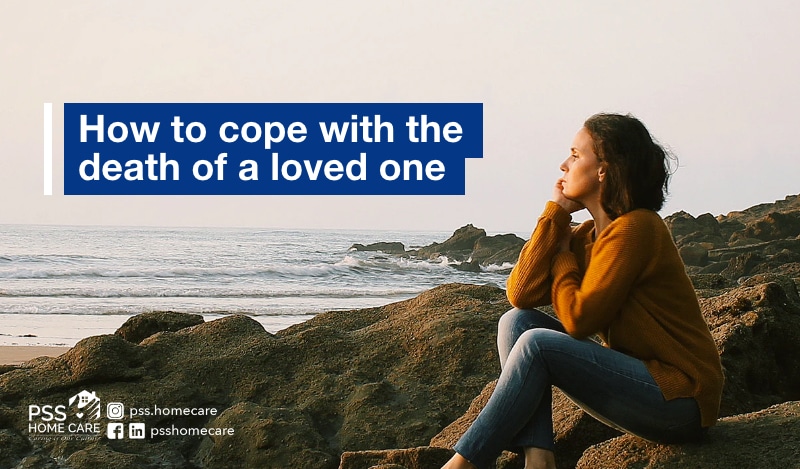A Woman’s Guide to Life After Menopause Menopause, which occurs...
Read More
- Neil Reyes
- August 5, 2021
- No Comments
How to cope with the death of a loved one

There are many things that are inevitable in life — and death is one of them. The loss of someone dear to you can bring about deep grief and sadness, and it can be even more overwhelming at a time of a global pandemic where stress and anxiety levels are already high.
With grief comes a plethora of emotions — sadness, guilt, shock, confusion, despair, and even relief that a loved one no longer feels pain or suffering — and all these can come at different times, or even simultaneously, with varying intensities and durations.
While grieving is a process that is different for everyone, we provide some tips on how to help people mourn and process the loss of a loved one.

01.
Remember that it’s okay to take your time and process grief at your own pace.
Accepting that a loved one is gone is difficult and painful, and it’s vital to understand that it’s perfectly fine to take one’s time in doing so.
“It’s normal for everyone to have different methods in processing grief. Even the lengths of time in which grief is processed — which can be short or long — is different for all… And that is absolutely okay,” remarked Luisa Remponi, PSS Home Care’s Director of Patient Services.
“Grief is different for everyone, and it’s important to know that it’s okay to allow yourself to grieve, even in situations where death is expected due to grave illnesses,” shared Luisa.
Giving yourself enough time and space to grieve and accept the parting of a loved one is good for your wellbeing. “Don’t put pressure on yourself to move on by a certain period of time. The process of healing varies, after all. What’s important is to take the time to heal,” said Luisa.
“You should also allow yourself to feel what you feel. Remember that your emotions, no matter how complex or overwhelming they may seem, are valid,” she added.

02.
Connect with and ask for help from others.
Losing a loved one is already a complicated experience for most — but experiencing it during a global pandemic is even more difficult. With lockdowns and quarantines in effect, grief can be even more difficult when experienced in isolation. “During the pandemic, there are many people around the world who have lost loved ones without being able to say goodbye, and that makes grieving even more challenging than it already is,” shared Luisa.
Sharing how you feel or expressing your feelings is vital in being able to accept the loss of someone dear to you.
“Having the support of someone that you love and trust will make you feel that you are not alone during difficult times. I know that at the moment, this can be harder to do, but calling a good friend and expressing your feelings, whatever they may be, can make a world of a difference,” said Luisa.
Connecting with loved ones can also allow you to open up about other difficulties that may directly or indirectly be due to how you’re processing your grief. By reaching out to friends and relatives, they can get a better understanding of how you are and help you with what you may need — from everyday chores to financial assistance.
“When you’re in touch with friends and family members, you can talk to them about how you’re feeling and you can also converse with them about other things, which can provide a welcome distraction of sorts. That is also healthy for your mental and emotional wellbeing. You can also reach out to them when you feel like you need or would like to try professional counseling,” stated Luisa.

03.
Remember their impact on your life and share their story with others.
Losing loved ones shouldn’t mean forgetting about them and their story. You can share their beautiful life with others through a virtual photo album or a blog post that your friends and relatives can enjoy.
“It’s also a good idea to connect with your loved one’s friends and your family members to ask about their favorite memories or stories,” remarked Luisa.
You can also honor their lives by continuing their legacy or by taking an interest in the things that they were passionate about.
“If your loved one was a great cook, you can try cooking some of their favorite dishes to make, or if your loved one regularly volunteered time to help others, you can also try doing charity work. Doing so might also help you move forward. Who knows, you might even find a new hobby or a great advocacy to live by,” said Luisa.

04.
Take great care of yourself
While it’s perfectly fine to take your time to grieve, you should also recognize that you need to take care of yourself. “Being mindful of your health and wellbeing should never be viewed as a selfish act, especially when you’re grieving,” stated Luisa.
Here are some acts of self-love that you can do to help you feel better:
- Go for healthy food choices. Try to consume less fastfood, chips, and sodas. If you don’t feel like you have enough appetite, never skip meals. Instead, opt for healthy drinks such as fruit smoothies and fresh juices.
- Get moving. Exercising and staying active can help release chemicals such as endorphins, often referred to as one of the “happy hormones,” that can help bring feelings of optimism and relaxation.
- Get enough rest. Make sure that you sleep at least 7 to 9 hours each night.
- Practice mindfulness. Many people find strength and resilience in spirituality by meditating for a few minutes each day or reading the Bible.
- Do things that you enjoy doing or try something new. You can find comfort in the things that you love doing or are interested in doing, such as reading novels, cultivating a small garden, or painting.
- Seek help. Talk to a friend, a therapist, a mental health professional, or a healthcare provider about how you’re feeling or about any changes that you’ve noticed in your mental, physical, or emotional being.
Losing someone dear to you is painful, stressful, and challenging in different ways and degrees, and you should know that it’s normal to feel a wide range of emotions when grieving. Fully accepting the loss of a loved one takes time, and you have to fully allow yourself to mourn at your own pace.
“Grief is different for everyone, and it’s important to know that it’s okay to allow yourself to grieve, even in situations where death is expected due to grave illnesses,” shared Luisa.
“Just remember to give yourself enough time, compassion, and love while you go through this challenging time in your life,” she added.
Check out our other articles
Monkeypox Overview: What It Is, Who’s At Risk, and What You Need to Know
Monkeypox Overview:What It Is, Who’s At Risk, and What You...
Read MoreLiving and Caring: Improving Patient and Caregiver Quality of Life with Respite Care
Living and Caring: Improving Patient and Caregiver Quality of Life...
Read MoreHappy Lives with HHAs: How to Help the Elderly with Loneliness
Happy Lives with HHAs: How to Help the Elderly with...
Read More



